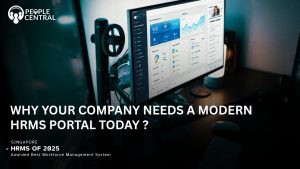As your company expands, so do the complexities of managing your workforce. HR management becomes more than just a function; it’s a strategic pillar for growth and success. The right HRMS solutions can streamline operations, optimize talent, and drive business outcomes. Let’s delve into the critical aspects of HR management for growing companies.
HR Management: Understanding the Challenges
Before exploring solutions, it’s essential to recognize the common HR hurdles faced by growing companies:
- Talent Acquisition: Finding, attracting, and hiring top talent becomes increasingly competitive.
- Onboarding and Training: Integrating new hires efficiently while providing adequate training is crucial.
- Employee Engagement and Retention: Maintaining a positive work environment and retaining key employees is vital.
- Payroll and Benefits Administration: Ensuring accurate and timely payroll processing while managing benefits effectively is complex.
- Compliance: Staying updated with labor laws and regulations can be time-consuming and costly.
HR Management Solutions: Core Components
To address these challenges, comprehensive HR management solutions typically encompass the following areas:
-
Human Capital Management (HCM) Systems
An HCM system is the backbone of modern HR management. It consolidates various HR functions into a centralized platform, improving efficiency and data accuracy. Key features include:
- Employee data management: Centralized storage and management of employee information.
- Talent acquisition: Applicant tracking, job postings, and onboarding automation.
- Performance management: Goal setting, performance reviews, and talent development.
- Time and attendance: Tracking employee hours, attendance, and time-off requests.
- Payroll and benefits administration: Accurate calculations, tax filings, and benefits enrollment.
-
Talent Acquisition and Onboarding
Effective talent acquisition and onboarding are crucial for business growth. Key elements include:
- Employer branding: Building a strong employer reputation to attract top talent.
- Recruitment marketing: Utilizing various channels to reach potential candidates.
- Candidate relationship management: Nurturing relationships with potential hires.
- Onboarding automation: Streamlining the new hire process for a smooth transition.
-
Performance Management
Performance management helps align employee goals with organizational objectives. Key components include:
- Goal setting: Defining clear and measurable performance expectations.
- Performance reviews: Regular feedback and evaluation of employee performance.
- Talent development: Identifying training and development needs.
- Succession planning: Identifying and developing high-potential employees.
-
Employee Engagement and Retention
A strong employee engagement strategy is essential for retaining top talent. Key strategies include:
- Employee surveys: Gathering feedback to understand employee satisfaction.
- Recognition programs: Acknowledging and rewarding employee contributions.
- Work-life balance initiatives: Promoting a healthy work-life balance.
- Career development opportunities: Supporting employee growth and advancement.
-
Payroll and Benefits Administration
Accurate and timely payroll processing is crucial for employee satisfaction and compliance. Key aspects include:
- Payroll calculations: Accurate calculation of wages, deductions, and taxes.
- Tax filings: Ensuring compliance with federal, state, and local tax regulations.
- Benefits administration: Managing enrollment, eligibility, and claims.
- Time and attendance tracking: Accurately recording employee hours.
HR Management: Choosing the Right One
Selecting the right HR management solution depends on your company’s size, industry, and specific needs. Consider the following factors:
- Scalability: The solution should be able to grow with your company.
- Functionality: Ensure the solution offers the features you need.
- Cost: Evaluate the total cost of ownership, including implementation and ongoing expenses.
- Integration: Consider how the solution integrates with your existing systems.
- Security: Protect sensitive employee data with robust security measures.
By investing in a comprehensive HR system management solution, growing companies can streamline operations, improve efficiency, and focus on strategic initiatives. Remember, HR is not just a department; it’s a strategic business partner that drives growth and success.








 5
5


























